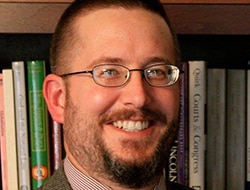
Conspiracy theories, as I discussed yesterday, are fundamentally at odds with a commitment to the truth. That may seem counterintuitive, because the one thing that every conspiracy theorist seems certain of is that, in the words of Fox Mulder, “the truth is out there.”
It is more correct, though, to say that, for conspiracy theorists, “the truth is in here” (he says, tapping on his forehead). The central attraction of conspiracy theories is that they are a kind of gnosis, a secret knowledge to which only some people are privy. Gnosticism is such a temptation because it plays to the first of the seven deadly sins: pride. Has there ever been a child in the history of mankind who hasn’t proudly proclaimed to a friend or a sibling, “I know something you don’t know!”?
Gnosticism was the earliest Christian heresy — so early, in fact, that it makes an appearance in the Acts of the Apostles (8:9-24) in the form of Simon Magus, from whose attempts to buy spiritual gifts we get the word “simony.” It has proved a perennial temptation, popping up in many different forms over the centuries, but rarely has it been as pervasive as it is in our day. Both in the Church and out of it, so many people think that they have found the key that unlocks the door behind which the secret truth lies.
Nothing could be further from the teachings of Christianity. “[A]sk and you will receive; seek and you will find; knock and the door will be opened to you” (Lk 11:9). The pursuit of truth lies at the heart of the Christian life, but even more importantly, the Church teaches that truth is not hidden or restricted but freely available to all who seek it.
Why? Because the truth isn’t a thing — a snippet of knowledge that we can discover, memorize, take to heart and possess fully from that point forward; rather, the Truth is a person, and that person — Jesus Christ — accepts all who walk in his way and seek the life he offers each one of us. “I came so that they might have life and have it more abundantly” (Jn 10:10) — so abundantly, in fact, that those who have it do not want to hide it under a bushel basket or keep it locked away behind a door but desire to share it with all mankind.
Gnosticism, like all sins that flow from pride, is selfish; Christianity is not. As in the multiplication of the loaves and fishes, the Christian life grows more abundant the more we share it with others. We draw closer to the Truth not by shutting others out but by inviting them in.
The gnostic, the conspiracy theorist, the ideologue, the political partisan — each has his own “truth,” in opposition to the truths of others, and he guards it suspiciously, as Sméagol guarded the One Ring, until it twisted and deformed him in mind and body and made him into the pathetic creature known as Gollum. The Christian, however, is the true philosopher, the lover of truth who seeks and embraces all that is true, even if (or, rather, especially if) it offends his pride, because he knows that all truth, as St. Augustine declared, is God’s truth.
Scott P. Richert is publisher for OSV.





